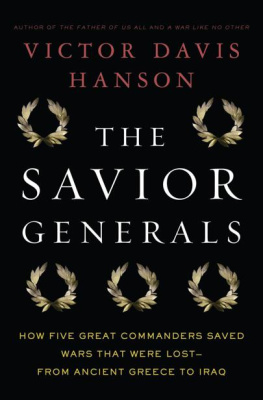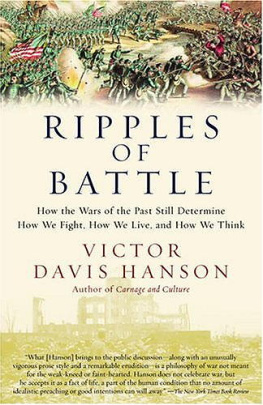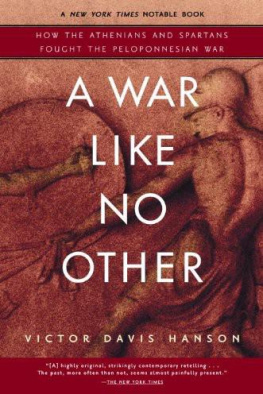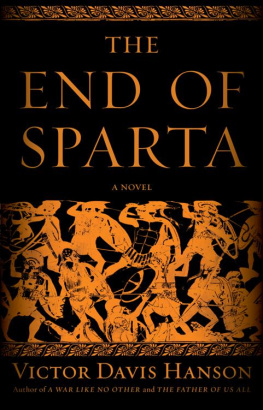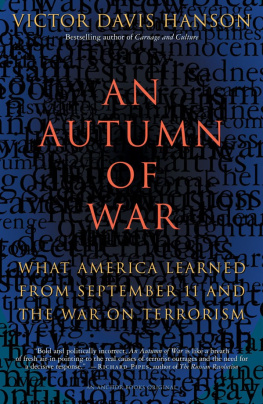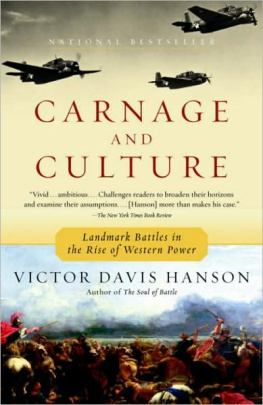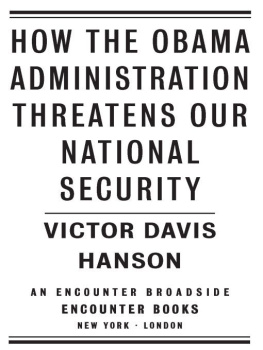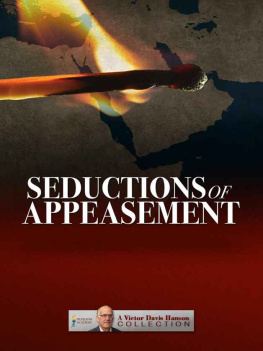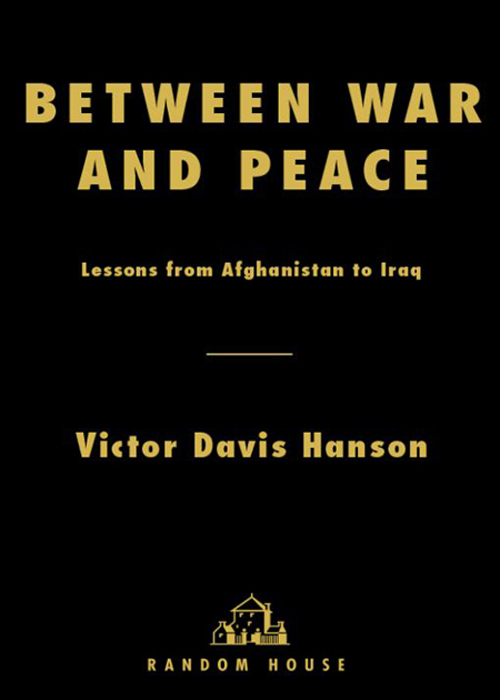
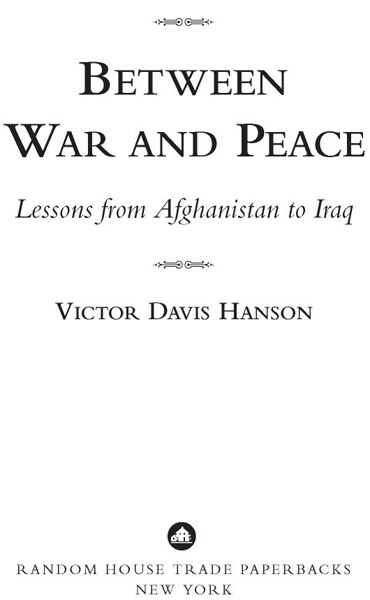
Table of Contents
FOR CARA AND PAULI
Introduction
The present volume is a sequel of sorts to An Autumn of War, a collection of essays I wrote about the war against terror, arranged in chronological order from the al Qaeda attacks on September 11 to the defeat of the Taliban in Afghanistan and subsequent events until January 2002. Between War and Peace takes up the narrative in January 2002 and ends in early July 2003, chronicling the evolving war against al Qaeda, the ongoing conflict in the Middle East, rising anti-Americanism abroad, our growing rift with Europe, the war with Iraq and its troubled aftermathand how study of the past offers us some hope of making sense of all these seemingly insolvable crises that seem to have erupted on September 11, 2001.
Once more I have left the articles and editorials in the form in which they appeared in the past two years, except for a few small corrections of typographical, grammatical, or spelling errors. Again, the book is in part a diary of actions recorded as they unfolded, and thus I think has some value in allowing the reader to assess the validity of arguments made at the time in light of what we now know from the actual events that later transpired.
However, in this volume I have also arranged the articles both topically and chronologically to provide greater thematic unity and coherence. Indeed, the war against terror that once seemed relatively straightforward in our efforts to destroy the al Qaeda bases in Afghanistan rippled out in unforeseen ways during the subsequent eighteen months to involve a full-fledged invasion of Iraq, a diplomatic showdown with the United Nations and our European allies, an escalation of conflict in Israel and on the West Bank and then a sudden effort at rapprochement, and a renewed debate here in the United States about the nature, morality, and intent of American foreign policy, leading to protests in intensity not seen since the turmoil of Vietnam.
I had thought that the pessimism that presaged defeat in Afghanistanthe mountains, remember, were too high, the weather too cold, the religious calendar too foreboding, the factions too numerous, the Taliban too ferocious, and the country itself the graveyard of the British and Russian armiesmight have been dispelled by the miraculous victory over the Taliban in a matter of six weeks at a cost of a handful of American lives. But it was not to be, as the renewed display of gloom during 20023 would prove.
Voices that had warned of quagmire in Afghanistan sought to reclaim legitimacy by forecasting millions of refugees and thousands of American dead in Iraq, with the Arab street exploding, the Middle East erupting, and our shores being attacked by a variety of revenge-minded terrorists from the Middle East. And yet when that war was won in three weeks at a cost of a few hundred American lives, as 180,000 allied soldiers subdued a country of twenty-six million, rather than being contrite about a continual misreading of events, prominent critics of both engagements, and indeed much of the mainstream media, focused on the difficult problems of reconstruction in the two countriesalmost as if the acknowledged costly (over 200 Americans were killed in Afghanistan and Iraq once formal hostilities ceased) challenges to implant democracy in aftermath of the two worst regimes in the Middle East redeemed their initial predictions of military paralysis.
Just as An Autumn of War ended after the amazing victory in Afghanistan amid the pundits predictions of disaster to come in Iraq, so too the victory in less than half the time over Saddam Hussein seemed to prompt cries of Vietnam redux in Baghdad.
As I write on July 4, 2003, we are again toldafter one of the most remarkable military victories in American historythat we are in perpetual crisis: no firm evidence of weapons of mass destruction in Iraq as yet uncovered; no word about the ultimate fate of Saddam Hussein; and constant sniping and assassination of American troops in postwar Iraq with deaths now reaching well over one hundred. Yet we forget that occupation is never easy consider the mess of restoring order to territories of the former Japanese empire in 1946and our task is made more difficult both by the sheer rapidity of a victory designed to shock rather than kill a large number of Baathist troops and the unlikely task of implanting consensual government in a region where democracy has no history.
Yet I remain optimistic that American efforts during postbellum occupationbased as they are on formidable military strength coupled with a humanitarian message of liberal reform and aimed at eradicating rogue regimes that facilitate terrorism and destructionwill eventually be as successful as were our remarkable military victories in Afghanistan and Iraq.
The themes of Between War and Peace differ somewhat from those essays of An Autumn of War. Whereas before I had thought that the inability of many prominent Americans to assess the advantage of Western militaries over their opponents, and indeed to appreciate the resiliency and enormous power of liberal democracies in general, was a result of either navet or ignorance about the nature of war, I sensed that as the aftershocks of September 11 continued, there was something far deeper and more profound that explained our endemic cultural pessimism. A theme, then, that underlies all these sometimes wide-ranging essays is my own search for answers for how and why so many educated and bright Americans seem to embrace a reductive worldview about the role and nature of their own countryalmost as if the more America proved itself powerful and moral in its efforts to eradicate medieval fascists and implant democracies in their places, the more many of our own experts sought to demonstrate that we either could or should not.
Much of my own sense of things, of course, grew out of lifelong residency on a small farm in the San Joaquin Valley of California and my own training as a classicist and military historian who teaches Latin and Greek to mostly minority students at California State University, Fresno. The two worlds are not as antithetical as they might seem. The Greeks, after all, were a rural people, and the literature of a Homer or Thucydides often reveals a tragic view of the human condition often shared by contemporary agrarians who through the daily experience of battling nature to obtain a livingand now so often failingagree that there are certain constraints on us all across time and space, given that the physical world remains unforgiving and the nature of man himself stays constant.
By tragic, of course, I mean the acceptance of certain givens in the human experience of any age: that culture and civilization are a thin veneer that protect us all from the innate savagery of our natural selves, that the world does not provide us with the reality of utopian perfection but rather with more mundane practical choices between something better and something probably worse, and that there are certain discernable, certain absolute criteria that exist to permit us to make necessary moral judgments even amid the relativist chaff of the times.
For the academic year 20023 I was, however, also the visiting Shifrin Professor of Military History at the United States Naval Academy at Annapolis. As part of the responsibilities of that professorship, I gave a number of lectures at various military installations and talked with hundreds of officers and civilian consultants throughout the year, especially during the March and April fighting with Iraq. The result was that I took a keen interest, as some of these essays will demonstrate, in the contrast between civilian and military life, and why the armed forces, of all places, seemed to have found practical solutions to a variety of stubborn social and cultural problemsachieving racial harmony and integration, inculcating a sense of purpose and mission in a purportedly bored lost generation of youth, and marrying abstract knowledge with common sense and muscular strengthin areas where our more vaunted universities and other government agencies have simply failed.
Next page

